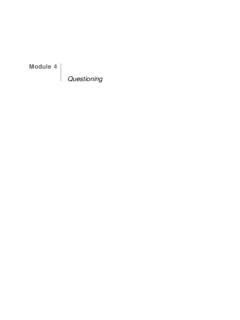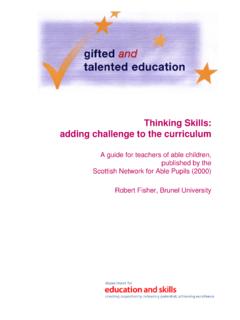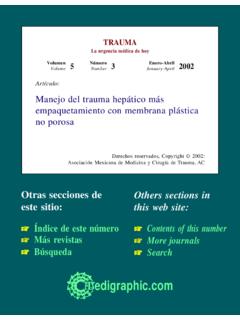Transcription of 4: UNDERACHIEVEMENT
1 LibraryLaunch Pad 4/UnderachievementPage 1 of 7 Westminster Institute of EducationMarch 2000 4: UNDERACHIEVEMENTWhat do we mean by UNDERACHIEVEMENT ?When embarking on any considerationof UNDERACHIEVEMENT in your school,first ensure that colleagues areagreed on a can be defined as an inability or failure to perform appropriately forone s age or talents, unfulfilled potential. Given this definition, however, it canclearly be extremely hard to identify underachievers, and to note when underachievementis taking , such as Cognitive Ability Tests and IQ-type tests, can be some help in somesubjects, when compared with the results of classroom-based assessment tasks and , if pupils are disengaged when undertaking them, the tests will not necessarilyhighlight potential; nor is IQ any longer considered an adequate indicator of potentialability in all areas.
2 A wider spread and more varied mix of methods multiple criteria,including teachers own judgements (especially if exercised after staff have had trainingon assessment and identification of pupils abilities) - are likely to identify theunderachievement existing in a school on a more realistic scale. (Teachers shouldhowever beware of bias in their own attitudes when assessing potential, about pupil behaviour; they should also be aware of the difficulty ofholistic judgements about pupils if assessment is fragmented between subjectdepartments.)Different underachievers may exhibit a variety of characteristics. A comprehensivemodel has not yet been devised that can organise educationalists current understandingof UNDERACHIEVEMENT . Until then, characteristics checklists may be especially (1996) suggests that the presence in a pupil of five or more of the followingindicators should lead teachers to suspect underfunctioning.
3 LibraryLaunch Pad 4/UnderachievementPage 2 of 7 Westminster Institute of EducationMarch 2000 inconsistent pattern of achievement in schoolwork subjects inconsistent pattern of achievements within a subject area discrepancy between ability and achievements, with ability much higher lack of concentration daydreaming clowning and other work-avoidance strategies poor study skills poor study habits non-completion or avoidance of assignments refusal to write anything down overactivity and restlessness overassertive and aggressive or oversubmissive and timid social behaviour inability to form and maintain social relationships with peers inability to deal with failures avoidance of success lack of insight about self and others poor literacy skills endless talking, avoiding doing membership of stereotyped minority group (not caucasian, male, middle-class).
4 WHY IS UNDERACHIEVEMENT AN IMPORTANT FOCUS IN THE CONTEXT OF THEEDUCATION OF GIFTED AND TALENTED PUPILS? Current definitions of high ability emphasise the importance of assessing the potentialof the individual. Teachers are urged to identify pupils with the potential to achieve,not just with achieved potential. Such a model of ability, however, highlights the factthat there may be significant numbers of pupils for whom there are discrepanciesbetween their potential and their predicted performance. If schools are to beaccountable for their success in educating the more able, they must address suchdiscrepancies in them, as in all other parts of school populations. Many teachers still find identification of able pupils difficult, while they may feelmore confident in identifying the less able, including less able able pupils may thus be especially at risk of being overlooked, and ofreceiving inadequate provision in schools.
5 In many schools, classrooms and peer groups, the prevailing social climate does notaccept or value high achievement in all areas of the curriculum. That climate will beexceptionally oppressive, and will create exceptionally powerful disincentives to highperformance, for those who are exceptionally able, it might be argued thatexternal pressures on the highly able to underachieve could be even higher than ontheir less able Pad 4/UnderachievementPage 3 of 7 Westminster Institute of EducationMarch 2000 Research in the USA indicates that culturally different and disadvantaged groupsare present in comparatively limited numbers in gifted programmes in Americanschools (Montgomery, 1996). It is likely that there is a similar pattern in the it is found that certain culturally different or disadvantaged groups have lowerratios of highly able pupils within them (research in this area is continuing, but isdifficult), schools need to fulfil the spirit of their equal opportunities policies byinvestigating the underachieving able in such groups in particular.
6 The same need islikely to be there amongst the groups of male and female pupils considered highlyable in different ARE THE KEY ISSUES TO CONSIDER? Without a clear understanding of and agreement on how to assess and identify thepotential of more able pupils, as well as their existing levels of achievement, a schoolwill not be able to tackle their problems of UNDERACHIEVEMENT . Butler-Por (1987) argues that UNDERACHIEVEMENT is not caused in the main by inabilityto do better but by either a conscious or an unconscious choice. Research, , Yewchuk and Mulcahy (1993), has shown that there are two main sets offactors affecting the performance of able underachievers: emotional and motivationalfactors, and factors concerned with strategies for learning. They believe that, whenfactors from the two sets are combined and interact, they seem to have the powerfulconsequence of preventing able pupils from becoming high achievers.
7 Emotional and motivational factors include the possibility that pupils: may be unaware of their own potential: they may lack insight about themselves andothers (Butler-Por, 1987) may have expectations that are too low and too limited, or too narrow and toostereotypic (Montgomery, 1996); Butler-Por (1987) suggests that this factor canmanifest itself as a lack of clear personal goals and values may have a sense of inadequacy and low self-esteem indeed, they may bevulnerable to disparagement by others (Butler-Por, 1987) may have experienced a high incidence of emotional difficulties (Kellmer pringle ,1970), and/or be prone to depression and anxiety (Butler-Por, 1987) may be unmotivated to achieve in school, despite a high self-concept (Montgomery,1996) may have a fear of failure (Montgomery, 1996) may have a fear of success (Montgomery, 1996) may have a habit of blaming others and acts of chance (Montgomery, 1996).
8 Research shows that once pupils who exhibit such tendencies do underachieve, thesetendencies can become self-fulfilling and perpetuate the pattern of UNDERACHIEVEMENT . Anindividual who is unaware of his/her own potential may become merely depressed byremarks such as You could do better , You need to pull your socks up , etc., thuscontinuing to underfunction. Freeman (1991) studied the way that students identified asLibraryLaunch Pad 4/UnderachievementPage 4 of 7 Westminster Institute of EducationMarch 2000 gifted feared they might be unworthy of the title and so avoided any challenge in casethey were found wanting, explaining their failures away by claiming that they did notmind or had found tasks uninteresting; as a result, they fell further and further behind inschool, only succeeding on tests that did not require any previous knowledge and thusfailing to fulfil their early promise.
9 Some emotional and motivational factors, Butler-Por (1987) shows, can stem from theinfluence of family and family background: hostility in family relations rejection of the value of that member of the family [ the pupil] [unreasoning and excessive] parental expectations lack of support for emotional and social development and stability lack of interest in the child .Other factors that should be added include: the background of a family, cultural, social or religious group with different values orgoals from those predominant at school the influence of a school and/or peer group ethos which does not value highachievement, or does not value it uniformly or consistently ( in rugby, but not inphysics) a conflict between the goals stated by school and the personal goals of the individual. Factors connected with learning strategies include the possibility that pupils: may have specific learning disabilities or difficulties, developmental dysphasia,developmental dyslexia, etc.
10 (Montgomery, 1996) may have sensory and/or physical impairments (Montgomery, 1996) may not perform well in test situations (McClelland, Yewchuk and Mulcahy, 1993) may achieve below expectation in one or all of the basic skill areas: reading,language arts, mathematics (McClelland et al., 1993) may submit work that is often unfinished or poorly done (McClelland et al., 1993) may have poor study skills may have poor work habits may avoid trying new activities (McClelland et al., 1993) may show tendencies to perfectionism and self-criticism (McClelland et al., 1993) may have difficulty functioning in a group (of any size) (McClelland et al., 1993) may set goals unrealistically, too high or too low (McClelland et al., 1993) may dislike practice or drill work, memorisation and mastery (McClelland et al.)







